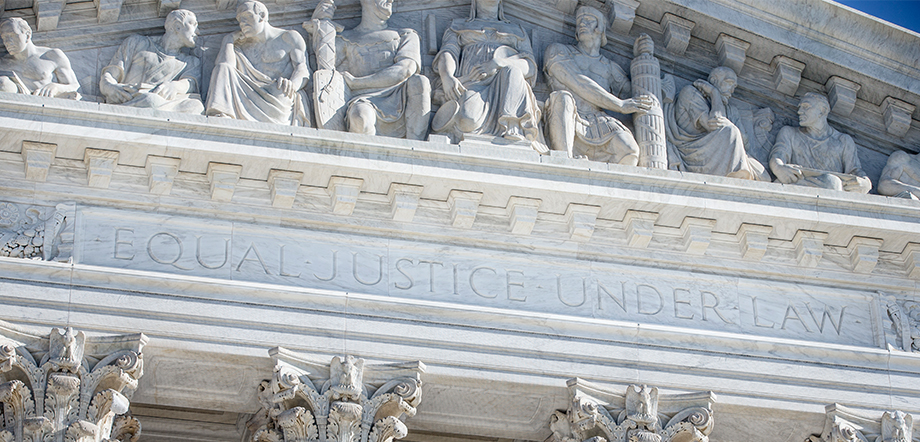Client Alerts
Supreme Court Clarifies Impact of Amended Complaints on Federal Jurisdiction
January 2025

Client Alerts
Supreme Court Clarifies Impact of Amended Complaints on Federal Jurisdiction
January 2025
By Michael Ruttinger and Ethan Weber
“When a plaintiff amends her complaint following her suit’s removal, a federal court’s jurisdiction depends on what the new complaint says.” That is the upshot of a significant new decision from the Supreme Court of the United States in Royal Canin U.S.A., Inc. v. Wullschleger (No. 23-677), issued on January 15.
Royal Canin clarifies a split among the federal appellate courts over the effect that post-removal amendments have on cases that are in federal court because of “federal question” jurisdiction. When a plaintiff files a lawsuit in state court, and that lawsuit includes a claim “arising under” federal law, federal law allows the defendant to remove the case to federal court. In such cases, the federal court may decide not only the federal question, but also may exercise “supplemental jurisdiction” over the state law claims in the lawsuit. Sometimes, however, the plaintiff will react to that removal by amending the complaint to excise the federal question. When that happens, Royal Canin holds, the federal court loses its ability to exercise supplemental jurisdiction over the remaining state law claims, requiring remand to state court.
Background
Anastasia Wullschleger sued Royal Canin in state court alleging deceptive marketing practices and asserting both federal and state law claims. Royal Canin removed to federal court based on federal-question jurisdiction. After, Wullschleger amended her complaint to eliminate the federal claims, leaving only state law claims, and sought remand.
The District Court denied her remand motion, but the Eighth Circuit reversed. See Wullschleger v. Royal Canin U.S.A., Inc., 75 F.4th 918, 920 (8th Cir. 2023) (“We must decide whether amending a complaint to eliminate the only federal questions destroys subject-matter jurisdiction. The answer is yes, so the case must return to state court.”). Royal Canin petitioned for, and the Supreme Court granted, certiorari to resolve a split between the Eighth Circuit and five others that had taken an opposite view (the First, Third, Fourth, Sixth, and Eleventh Circuits).
Decision
The Supreme Court sided with the Eighth Circuit, holding that when a plaintiff amends a complaint post-removal to remove federal claims, leaving only state law claims, the federal court loses supplemental jurisdiction. The Court emphasized that although 28 U.S.C. §1367(a) grants supplemental jurisdiction over state law claims that form part of the “same case or controversy” as a federal claim, the basis for supplemental jurisdiction disappears if the related federal claims are withdrawn.[1]
Justice Kagan—writing for the unanimous Court—noted that the Royal Canin holding is consistent with prior precedent, including Rockwell Int’l Corp. v. United States, where the Supreme Court previously held that “when a plaintiff files a complaint in federal court and then voluntarily amends the complaint, courts look to the amended complaint to determine jurisdiction.” 549 U.S. 457, 473–74 (2007). In that context, when a plaintiff amends to remove federal claims, it “divests the federal court” of its “adjudicatory power.” Id.
The Court’s holding has a clear and immediate impact: “changes in parties, or changes in claims,” by way of an amended complaint “remake the suit,” including “its jurisdictional basis.” Slip Op. at p. 12. Put simply, “an amendment can wipe the jurisdictional slate clean, giving rise to a new analysis with a different conclusion.” Id. at p. 10. Thus, once amendment occurs, “jurisdiction follows the amended (i.e., now operative) pleading” and that rule “applies across the board.” Slip Op. at p. 13.
Implications
This ruling matters to litigation strategy:
- Strategic Amendments: Plaintiffs may amend complaints to remove federal claims or diverse parties after removal and then seek (and all but guarantee under Royal Canin) a return to state court. This may come by way of a motion for leave to amend, stipulation, or amendment in response to a motion to dismiss.
- Jurisdictional Considerations: Defendants should remember that removal to federal court can be undermined if plaintiffs eliminate federal claims through amendment. Thus, when federal and state law claims may be duplicative (e.g., Title VII and a parallel state statute), a federal forum is not a given if the federal claims are voluntarily dismissed.
- Litigation Planning: Plaintiffs and defendants must carefully consider the timing and content of pleadings and amendments, as they directly impact jurisdictional authority. Defendants should be cognizant of requests to amend pleadings that would eliminate federal claims, as it may divest jurisdiction.
[1] It appears from the procedural history of the case and the Eighth Circuit’s opinion that this rule applies to voluntary amendments, not where a plaintiff is “ordered” to amend or the “decision to amend was otherwise involuntary.” Wullschleger v. Royal Canin U.S.A., Inc., 75 F.4th 918, 922 n.1 (8th Cir. 2023).
ADDITIONAL INFORMATION
For more information, please contact:
- Michael J. Ruttinger | 216.696.4456 | michael.ruttinger@tuckerellis.com
- Ethan W. Weber | 216.696.3629 | ethan.weber@tuckerellis.com
This Client Alert has been prepared by Tucker Ellis LLP for the use of our clients. Although prepared by professionals, it should not be used as a substitute for legal counseling in specific situations. Readers should not act upon the information contained herein without professional guidance.

